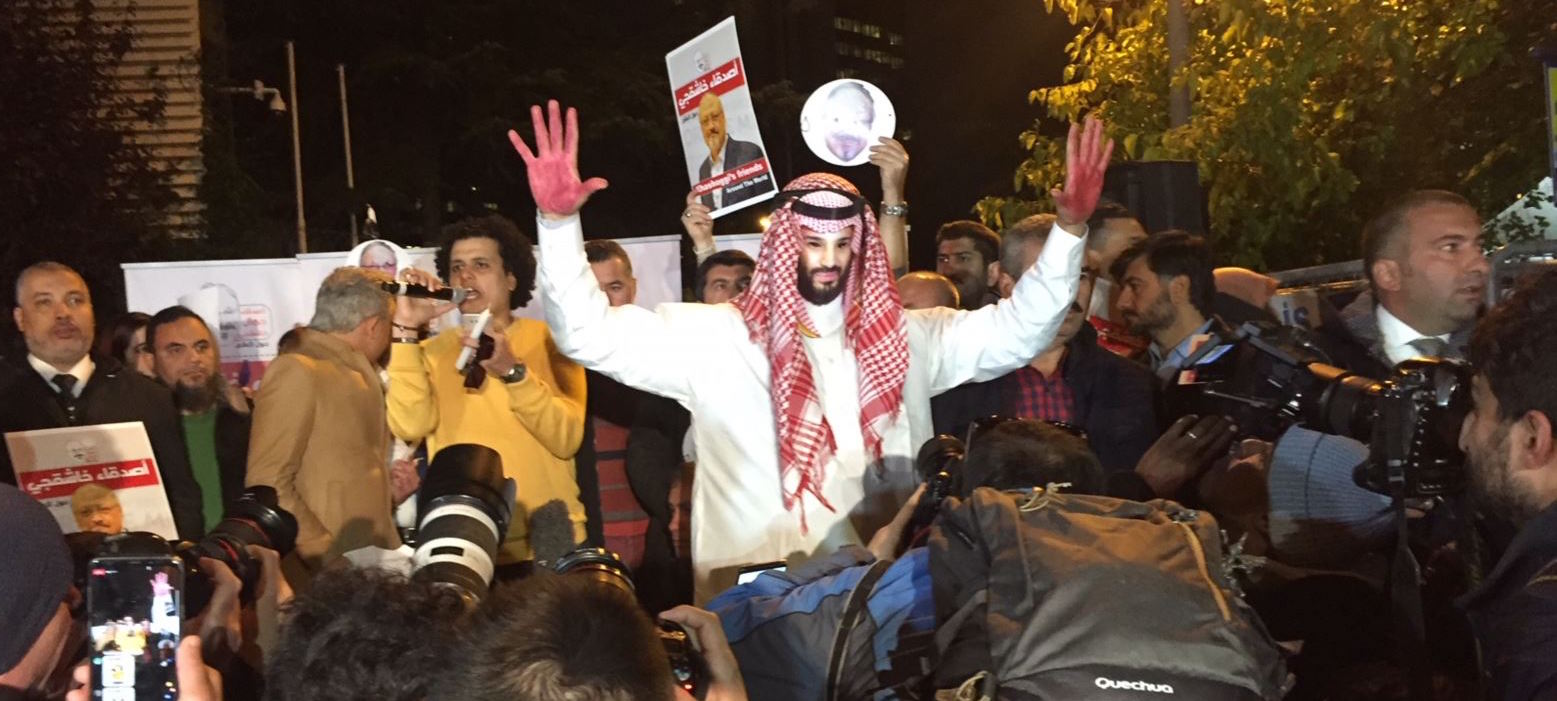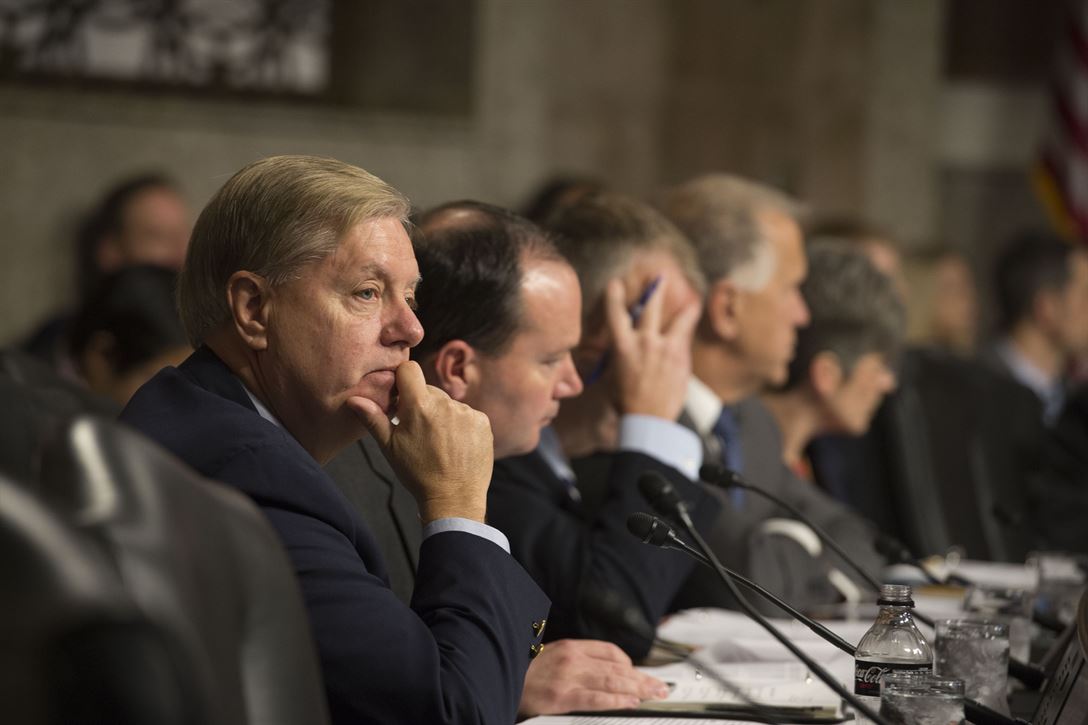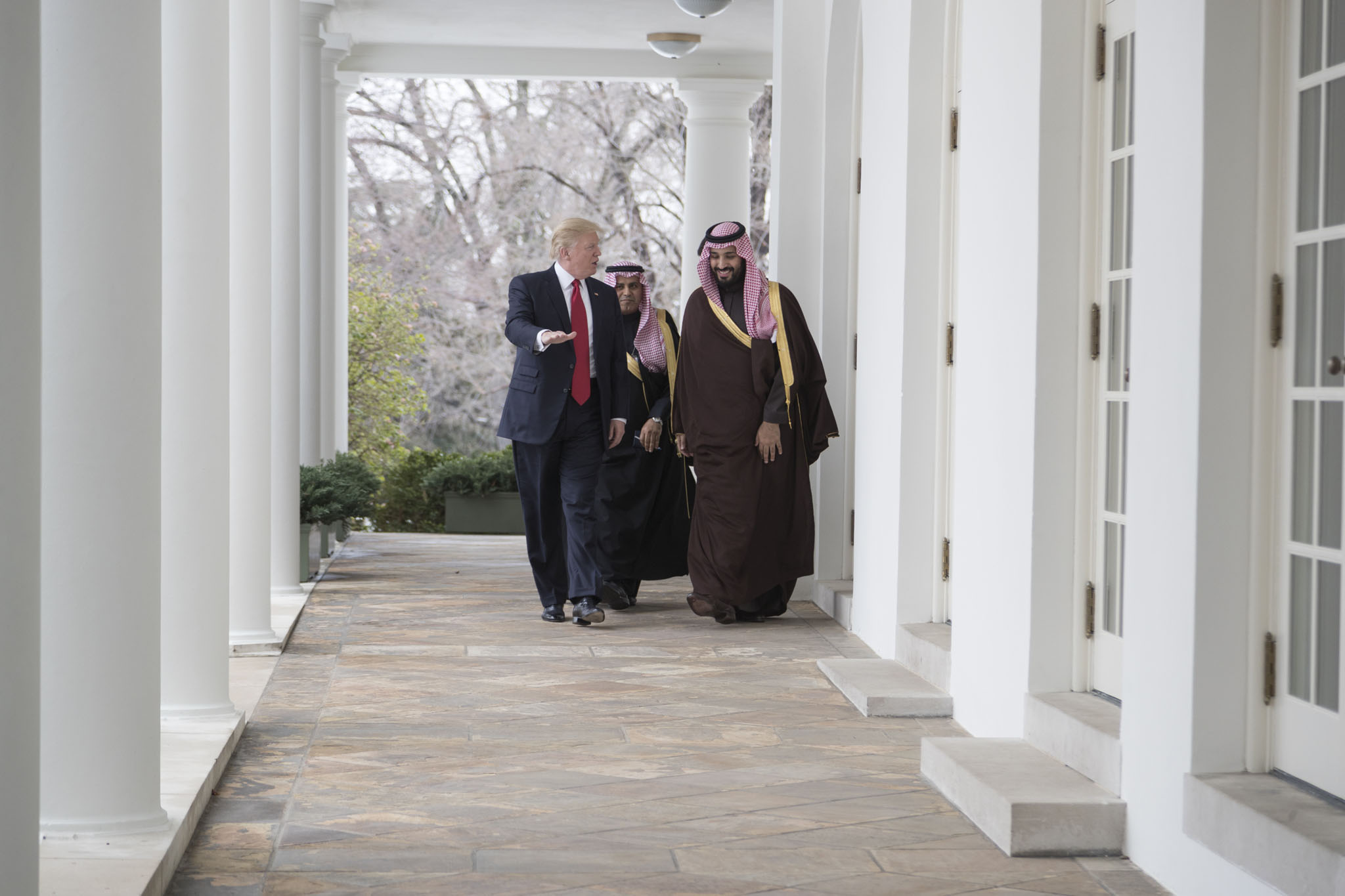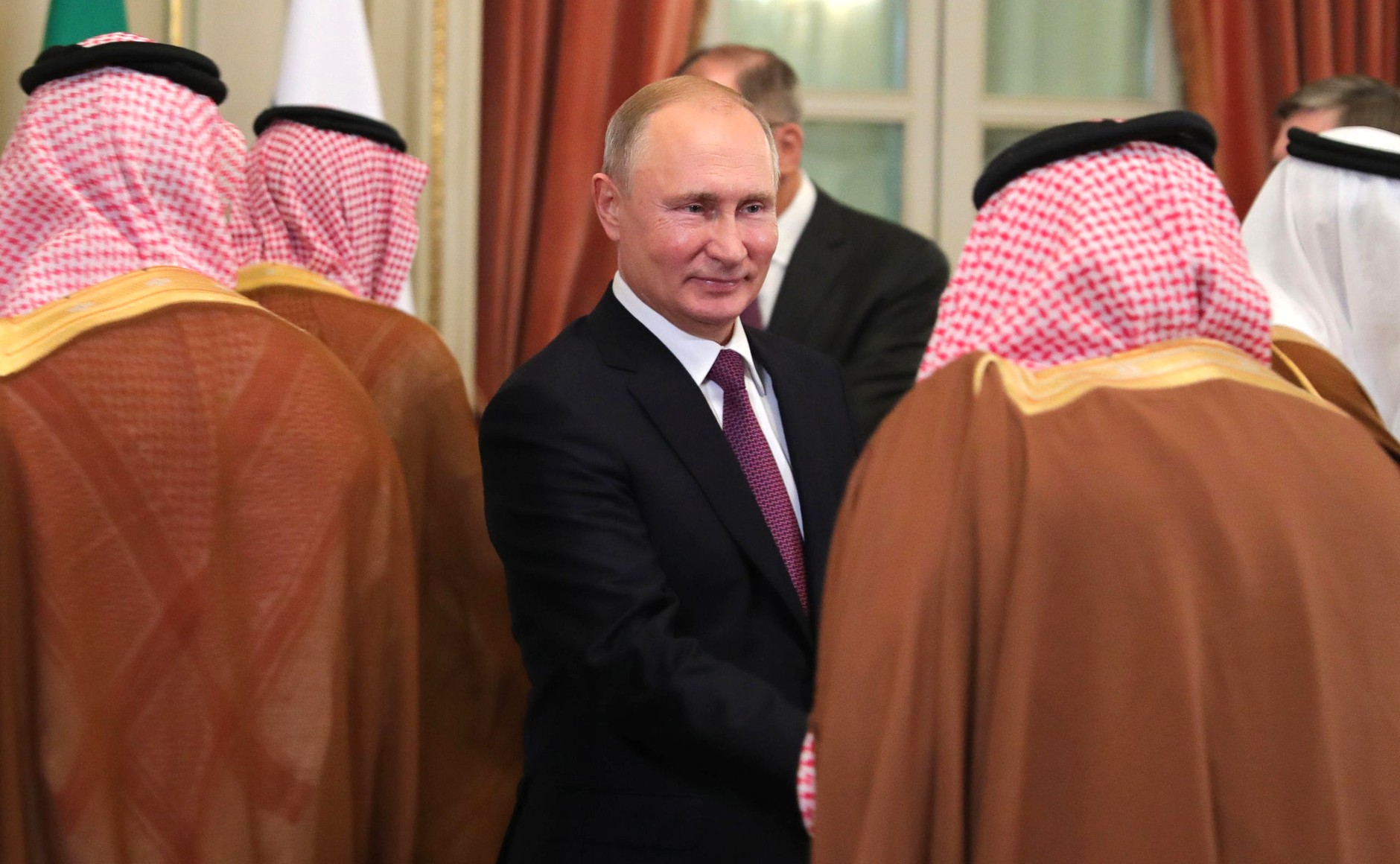Riyadh finds it outrageous that American lawmakers are trying to meddle in Saudi Arabia’s succession, writes Giorgio Cafiero.

Istanbul protesters outside Consulate General of Saudi Arabia following the murder of Khashoggi. (Hilmi Hacaloglu, VOA via Wikimedia Commons)
By Giorgio Cafiero
Special to Consortium News
 Since the murder of Jamal Khashoggi in the Saudi consulate in Istanbul on Oct. 2, some American lawmakers have assumed the right and moral authority to dictate the Kingdom of Saudi Arabia’s succession line-up. In November, Republican Sen. Lindsey Graham accused Saudi Crown Prince Mohammed bin Salman (MbS) of being “crazy” and asserted that “he needs to go.” Such rhetoric is significant given that the U.S. has not meddled in the Al Saud family’s internal power struggles since the 1960s. But regardless of the preferences that some politicians in Washington may have regarding Saudi Arabia’s succession, the U.S. will likely have to accept dealing with a King Mohammed.
Since the murder of Jamal Khashoggi in the Saudi consulate in Istanbul on Oct. 2, some American lawmakers have assumed the right and moral authority to dictate the Kingdom of Saudi Arabia’s succession line-up. In November, Republican Sen. Lindsey Graham accused Saudi Crown Prince Mohammed bin Salman (MbS) of being “crazy” and asserted that “he needs to go.” Such rhetoric is significant given that the U.S. has not meddled in the Al Saud family’s internal power struggles since the 1960s. But regardless of the preferences that some politicians in Washington may have regarding Saudi Arabia’s succession, the U.S. will likely have to accept dealing with a King Mohammed.
MbS’s ascendancy, which began in 2015, has transformed Saudi Arabia. Gone is Saudi Arabia’s traditional model of leadership of the pre-MbS era that was based on collective decision-making and consensus building among a large group of princes. By virtue of how much power MbS possesses, it is difficult to imagine any credible challenge to his rule, or position in the succession lineup, no matter the pressure Washington might try to impose.
Even before the Khashoggi affair, MbS’s power in Riyadh was so consolidated that the millennial prince faced virtually no constraints from other members of the Al Saud family. In recent months, MbS has only further consolidated his power in the Kingdom despite all the criticisms that MbS has received from lawmakers in the U.S. following the CIA’s conclusion that he ordered Khashoggi’s murder. Not even the political fallout of the journalist’s slaying last year has caused MbS to ease his internal crackdown, or even his targeting of Saudi dissidents overseas with efforts to lure them back to the Kingdom.
Thus, given that the Saudi security apparatus and all the dominant state institutions are under MbS’s consolidated control, it is extremely difficult to imagine any successful opposition to the millennial prince from within. While many in the House of Saud dislike MbS, they lack the ability to collectively stop him.
As the Kingdom is an absolute monarchy, the decision to change the succession order can only be made by King Salman. Although Salman, since he became the Saudi monarch in January 2015, has twice dismissed/forced out two other crown princes — Prince Muqrin (in April 2015) and Prince Mohammed bin Nayef (in June 2017) — he has shown no signs of removing his son from succession.

Lindsey Graham at Senate Armed Services Committee hearing on military strategy in the Middle East, 2015. (Air Force Senior Master Sgt. Adrian Cadiz)
Riyadh: Butt Out
From Riyadh’s perspective, foreign powers need to butt out and stop naively pretending they can influence the process. Furthermore, outside pressure on King Salman to fire his son could backfire and give the Saudi leadership more interest in standing by MbS. As Prince Turki al-Faisal, a former chief of Saudi intelligence and a former ambassador to Washington, put it: “The more [foreign] criticism there is of the crown prince, the more popular he is in the kingdom.”
Indeed, officials in Riyadh find it outrageous that American lawmakers are trying to weigh in on Saudi Arabia’s succession question — a redline for the Kingdom’s leadership. For Saudi Arabia’s ruling family, changing the succession lineup under pressure from the U.S. government would signal weakness and subservience to the world’s superpower at a time when Riyadh is working to project Saudi dominance in the Middle East and greater autonomy from the West as the world becomes more multipolar.
Please Make a Donation to Our
Spring Fundraising Drive Today!
Such pressure from the U.S. would likely accelerate Riyadh’s eastward geopolitical pivot which has led to Saudi Arabia investing in deeper ties with China, India, Pakistan, and Russia. With the Saudi leadership questioning the long-term commitment of the U.S. to the Kingdom’s security, Riyadh is attempting to diversify its global alliances and partnerships in order to gain greater geopolitical independence from Saudi Arabia’s traditional Western allies. The silence from these non-Western governments on the Khashoggi file underscores such non-Western states’ keenness to avoid criticizing Saudi Arabia on human rights grounds—a factor that has earned them goodwill with MbS—in order to capitalize on all that deeper ties with Riyadh can offer. In the case of both China and Russia, the Khashoggi case has provided an opportunity to drive a greater wedge between the U.S. and its main ally in the Persian Gulf.
Bilateral Risk
If Trump’s successor shares Sen. Graham’s view that MbS should never become the King of Saudi Arabia, Riyadh’s alliance with Washington could face an unprecedented bilateral crisis. Already, with MbS’ reputation among American lawmakers and members of the DC establishment having suffered immense damage following Khashoggi’s killing, the Crown Prince simply cannot make a visit to Washington. While for the time being MbS can continue working with a U.S. president whose administration has taken pains to give the crown prince the benefit of the doubt on the Khashoggi file, questions about Saudi-U.S. relations in the post-Trump era must unsettle the Saudi leadership. Given the rhetoric about Saudi Arabia and the Saudi-U.S. alliance coming from some Democratic presidential hopefuls, such as Sen. Bernie Sanders and Rep. Tulsi Gabbard, such concerns cannot be dismissed by MbS.
Of course, there is a potential scenario whereby MbS is targeted internally, possibly meeting the same fate as Anwar Sadat, the Egyptian president who was assassinated. This would prevent the crown prince from becoming custodian of the two holy mosques (the Saudi king’s official title since 1986). But such a scenario appears unlikely. What is far more probable is that MbS will become Saudi Arabia’s next king, even if this fuels rage in the U.S. Senate. As much as many officials in Washington take major issue with MbS, accepting the unacceptable will likely be necessary. The U.S. will have to contend, one way or another, with a King Mohammed ruling Washington’s most important Arab ally and the country that leads globally in oil production and exports.
Doubtless, the implications of MbS becoming the next Saudi king will be felt across the greater MENA region and beyond. As evidenced by the war in Yemen, the blockade of Qatar, the Saudi-Canadian diplomatic spat of August 2018, the Ritz Carlton arrests and Saad Hariri saga of 2017, the millennial prince has made foreign policy decisions that reflect his brashness and impulsive thinking. If MbS has already created such crises for Saudi Arabia and its relationship with Washington over the course of the past four years, it is truly mind boggling to think about what he, as the next king of Saudi Arabia, could do to change the Kingdom and the greater Middle East during the upcoming four or five decades if he rules until his natural death.
Giorgio Cafiero (@GiorgioCafiero) is the CEO of Gulf State Analytics (@GulfStateAnalyt), a Washington-based geopolitical risk consultancy.
Honor the Legacy of Bob Parry with a
Donation to Our Spring Fund Drive.



We should have Nuked Riyadh, by 2004, at the very latest.
Graham’s loud hissing that MbS “needs to go” has more to do with pro-Israel Lobby efforts to divert attention from the Saudi-Israeli strategic “partnership”, that includes Saudi and Israeli support for terrorist groups battling the governments of Syria, Iraq, and Iran.
A recent analysis of the situation in Syria does not directly mention Saudi Arabia, Israel, or Trump’s decision to recognize Israel’s annexation of Syrian territory in the Golan Heights. However, it does precisely illustrates the environment created by the Saudi-Israeli strategic “partnership” in cooperation with the pro-Israel Lobby crafted US policy in the region:
“Washington’s illogical and contradicting narratives undermine any notion of unified purpose in the Middle East. Even if its goal is regional hegemony, its multitude of failures and lack of incentives for allies undermine any chance of success.
“In the absence of a sensible, unified purpose, attractive incentives, or a coherent strategic plan, the US has instead turned to spoiling reconciliation and reconstruction through attempts to divide the region along ethnic lines, preserve what few terrorists remain by shuffling them between Iraq and Syria through territory US forces occupy, and by targeting nations and their allies with sanctions to hinder reconstruction efforts.
“Sanctions on Iran directly impact Tehran’s efforts to assist Syria and Iraq in reconstruction and the rehabilitation of their respective economies. So do US sanctions on Moscow.
“The US is also targeting fuel shipments attempting to reach Syria – with Syria’s own oil production hamstrung by the ongoing illegal US occupation of Syria’s east where much of its oil resides. […]
“The combination of sanctions and deliberate attempts to prolong the proxy war in Syria illustrate Washington’s true attitude toward any notion of “responsibility to protect.”
“Fuel will still reach Syria’s government and military where it is needed most – but will cause extraordinary suffering among Syria’s civilian population – as Washington explicitly intends.
“Washington is not attempting to remove the government in Damascus to alleviate the suffering of the Syrian people – it is causing immense suffering among the Syrian people to remove the government in Damascus.”
US Defeat in Syria Transforms into Campaign of Spite
By Tony Cartalucci
http://landdestroyer.blogspot.com/2019/04/us-defeat-in-syria-transforms-into.html
Salam… the USA should face her internal contradiction and leave cradle of Islamic civilization alone.The ruling house must resist all attempt s to meddle into their affairs as it concerns leadership succession.May Allah guide and direct the Kingdom aright.amin ya Robi
This the man who you really afraid. This is the man who really we want
All of us this the man who will destroy the dreams of US politicians who serve the interst of Israel and Iran not the interst of American peoples.So shout as you can Mr.Cafeiro tge only looser in the end is the American peoples
“If you look at Israel, Israel would be in big trouble without Saudi Arabia. So what does that mean? Israel going to leave? Do you want Israel to leave?” – Donald Trump in November 2018
https://www.youtube.com/watch?time_continue=1&v=oiyeWel2low
Let’s be clear, from the pro-Israel Lobby standpoint, Trump, the obsequious Senator Lindsey Graham, and Netanyahu are all perfectly “on message”.
Members of the Congress can make all the noises they want against his alleged involvement in the Khasoggi affair but it will all be only in vain because both Trump and MBS are characters with similar personality traits and don’t mind lucratively working together.
Thus Americans and other like-minded critics can’t simply wish them away, barring some mishaps on either side of the U.S.-Saudi power equation !
Mbs has America by the ba**s? For all Lindsay Graham’s big mouth spiel & tough talk threatening to rein in MBs, the simple fact is America needs Saudi Arabia more than the other way round? That’s why the NOPEC Law has died & the War in Yemen continues with US support with Trump vetoing Congress & why Khashoggi’s murderers & MBs’s complicity in the murder, has now disappeared from official Govt channels? Saudi Arabia has a kill switch connected to the American Empire, a damocles sword hanging over them & they will use it to cripple the US economic system if push comes to shove? That sword is the abandonment of the US dollar which Saudi oil is priced in! The US Petrodollar system which enables America to maintain Dollar hegemony as the Worlds reserve currency & enables the US to print trillions of dollars, out of thin air, to fund its endless deficits, Wars & economy without collapsing from this debt creation, can’t be allowed to fail at any cost as the US Economy would collapse into a big debt mountain? So America is joined at the hip with Saudi Arabia, locked in a dance with the devil, with MBs leading, for better or worse?
The indisputable “brashness and impulsive thinking” of MbS was revealed in the genocide in Yemen, the Kashoggi murder in its own embassy, the Ritz-Carlton arrest and extortion of its opposition, and by the continued suppression of women’s rights. No problem for the US dictatorship of the rich.
It is important to contrast this “keenness to avoid criticizing” the US “main ally in the Persian Gulf” or “most important Arab ally and the country that leads globally in oil production and exports” with the attitude of the same US oligarchy toward Venezuela. Clearly oil is not a factor, as the US can buy it from either country without any specific policy, and they have very similar amounts of oil.
The only difference is that Venezuela protects the rights of its people and hurts no one, which earns the contempt of the US dictatorship; while Saudi Arabia protects Israel as they return money dumped on them by the US as bribes to US politicians. Mass murder, tyranny, and corruption are the sacred values of the US dictatorship.
So Venezuela has to get with the program, and offer bribes US politicians in exchange for elimination of sanctions. No doubt that was Guano’s program, But even Maduro can play Keep the Change, and even be represented as bitterly opposed to human rights in private.
Let’s hope that Venezuela learns to play all sides, but mainly support progressives in the US. Israel has proven that a country with no value at all to the US can control its mass media and elections, and thereby deserve billions in aid annually to feed back as bribes for that purpose.
Generally correct Sam.
Saudi is light sweet, Venezuela is heavy crude.
Kochs own heavy crude refineries on USA gulf coast, hence tar sands (heavy crude) pipelines to gulf.
Thus the push to cease the Venezuelan heavy crude supplies to the Caribbean.
Thanks for details of the crude supply, James; very interesting.
So the Venezuela crude competes more with tar sands than Saudi oil?
Do you agree that the US can buy what it needs with a neutral policy?
Can we make do with either type of crude oil, or must we have both?
I think that the US is exporting a lot of the light crude it produces in the shale fields since it cannot be refined in the gulf coast refineries. The tar sands oil from Canada is very expensive and environmentally damaging to produce hence the push to grab the Venezuelan oil which is much cheaper. The Koch’s and their ilk think they have a Devine right to take other nations resources.
You must read Greg Palast or saw this on Jimmy Dore at around the 3:30 mark.
https://www.youtube.com/watch?v=HeNCbXVHrR8
Saud dynasty inherited tribal traditions where order is given and not taken. MBS can give orders to Trump and not vice versa
Giorgio, I’m afraid you left out another major parameter: Israel and it’s increasingly important , although unnatural, at first sight, relationship with Saudi Arabia.
How about including the Kushner- MBS relation in the equation?
“Khashoggi’s killing,” The hypocrisy is nauseating! How many political opponents has the US knocked-off?
mbs is not a Muslim he should be removed from the entire kingdom. He is disliked by Almighty
Readers may enjoy this just-published analysis about America’s relationship with the Saudi Crown Prince:
https://chuckmanwordsincomments.wordpress.com/2019/04/20/john-chuckman-comment-tulsi-gabbard-hits-a-homerun-with-her-epithet-about-trump-making-america-saudi-arabias-prostitute-and-heres-some-insight-into-the-ugly-relationships-between-america-an/
Was the US involved at all in the 1975 assassination of King Faisal?
Did Hillary fall down any rabbit holes that year?
Donald Trump speaking about Israel and the Khashoggi affair, November, 2018:
“Israel would be in big trouble without Saudi Arabia.”
Huge.
https://www.haaretz.com/middle-east-news/EXT-MAGAZINE-will-khashoggi-s-murder-foil-the-saudi-israeli-thaw-1.7132446
Saudi Arabia and the other OPEC countries get the blessings of US/bankster lawmakers because of the 1972 Petro-dollar arrangement. They agree to sell oil using the U.S. dollar as world reserve currency, we supply them with military weapons of mass destruction. Our corrupt Zionist government cares very little about human rights so it won’t matter what title MbS has, the U.S. will continue to send our tax dollars their way and Israel’s way until enough US citizens wake up and stop the insanity.
The United States intervened in the Saudi government when it supported Prince Faisal against King Saud. Faisal was appointed King of Saudi Arabia. Trump does not want to remove MBS because he sees him as the right partner to serve Israel. He made this statement when he said: “Do you want Israel to leave?” in response to criticism about MBS support after Khashoggi’s death.
LOL. So the house of Saud has finally, at long last, passed beyond those who could remember when it all started back in WWI. Well, the US is in for another shock. Three Names, when the US was pushing itself on India, said something along the lines of when we partner with another country, we just assume that we are the senior partner but with India, that’s not the case. And it will no longer be the case with Saudi Arabia either. It was MbS who said, if they pass the NOPEC law in the United States, they can kiss their economy goodbye. That kind of confidence won’t sit well with the likes of Lindsey Graham.
ALLAH PAK WILL CHOOSE BEST PRSON TO TWO HOLLY MOSQUES.AAMEEN
Im not very familiar vith Midll East politics,but some looks very interesting- like other world want isolate Gulf countries,abd theb taje over.Hope,im not understanding something …..
It’s time for a Democratically elected government. This is a dictatorship goverment and not accepted Islamically. Muslims of the world are not happy at all with this Saud family ruling.
Not to gainsay anything in this reasonable article by Giorgio Cafiero, but the first succession past the generation of Ibn Saud’s sons, especially when the incumbent heir can be tarred as persona non grata in Washington (at least for now), could be more tumultuous than seems likely at this moment. I wouldn’t rule out fireworks.
Americans think they rule the world, no matter how often they fail.
“Riyadh finds it outrageous that American lawmakers are trying to meddle in Saudi Arabia’s succession”
As the song asserts:
“New York, New York
So good they named it twice”
The opponents have a tendency to prefer repeats.
“New York, New York
So nice they named it twice”
“So nice they named it twice”
Sometimes rabbit holes (mistakes) are fashioned for reasons.
In this case to facilitate a reference to NY bankruptcy in the early 1970’s which Mr. Nixon refused to fund since “The United States of America” was never united and Mr. Nixon and others did not call it New York, New York but used another designation sometimes starting H and sometimes starting J followed by town, usually prefaced by his favourite expletive starting with f to the regular discomfort of his consigliere, a contributory cause of the increased assay of fiat in the US dollar, the petro-dollar agreements that others fund the “wars” including in part the Yom Kippur War of 1973, the rise of “neo-liberalism” and acceleration of “financialisation”.
Portals are pathways never destinations although “exceptionalists” are loathe to agree.
Thank you for your contribution.